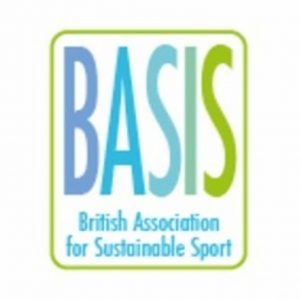The Sport and Physical Activity Research Centre (SPARC) invites you to join us at our lunchtime seminar, “Returning to Sport Sustainably Post-Covid”. The seminar is taking place on Wednesday 7 July, between midday and 1.30pm.
The event, which is being held in conjunction with BASIS (the British Association for Sustainable Sport), aims to bring together practitioners and academics working in sport & sustainability, to discuss key issues and best practice as we emerge from lockdown.
The seminar is an excellent opportunity for BU staff to engage with those working in industry, in one of BU’s Strategic Investment Areas – Sustainability.

Programme:
12.00 Introduction: Sport and Sustainability Research – Raf Nicholson (Bournemouth University)
12.10 Building Back Better: The BASIS White Paper – Russell Seymour (CEO of BASIS)
12.25 Strategies to Ensure the Sustainability of Women’s Sport – Beth Clarkson (University of Portsmouth) and Keith Parry (Bournemouth University)
12.40 Returning to Action – Leigh Thompson (Head of Policy, Sport and Recreation Alliance)
12.55 Roundtable Discussion: Returning to Sport Sustainably Post-Covid
The Zoom link for the seminar is here: https://bournemouth-ac-uk.zoom.us/j/89306375276?pwd=SWJSay80QTl3V256eWk2N3JhMUtmUT09
For any queries, contact Dr Raf Nicholson – rnicholson@bournemouth.ac.uk
 I joined colleagues in FMC in launching the Science, Health, and Data Communications Research Group, a growing centre of cross-faculty BU researchers creating and researching public communications and education on pivotal topics such as climate change, dementia, mental health, COVID, sustainability, ecology, and more. We are hosting our
I joined colleagues in FMC in launching the Science, Health, and Data Communications Research Group, a growing centre of cross-faculty BU researchers creating and researching public communications and education on pivotal topics such as climate change, dementia, mental health, COVID, sustainability, ecology, and more. We are hosting our 











 Missing Persons Indicator Project Recruitment
Missing Persons Indicator Project Recruitment Celebrating our Research: Postgraduate Research Showcase 2026
Celebrating our Research: Postgraduate Research Showcase 2026 Nursing Research REF Impact in Nepal
Nursing Research REF Impact in Nepal Fourth INRC Symposium: From Clinical Applications to Neuro-Inspired Computation
Fourth INRC Symposium: From Clinical Applications to Neuro-Inspired Computation ESRC Festival of Social Science 2025 – Reflecting back and looking ahead to 2026
ESRC Festival of Social Science 2025 – Reflecting back and looking ahead to 2026 3C Event: Research Culture, Community & Cookies – Tuesday 13 January 10-11am
3C Event: Research Culture, Community & Cookies – Tuesday 13 January 10-11am ECR Funding Open Call: Research Culture & Community Grant – Application Deadline Friday 12 December
ECR Funding Open Call: Research Culture & Community Grant – Application Deadline Friday 12 December MSCA Postdoctoral Fellowships 2025 Call
MSCA Postdoctoral Fellowships 2025 Call ERC Advanced Grant 2025 Webinar
ERC Advanced Grant 2025 Webinar Horizon Europe Work Programme 2025 Published
Horizon Europe Work Programme 2025 Published Update on UKRO services
Update on UKRO services European research project exploring use of ‘virtual twins’ to better manage metabolic associated fatty liver disease
European research project exploring use of ‘virtual twins’ to better manage metabolic associated fatty liver disease